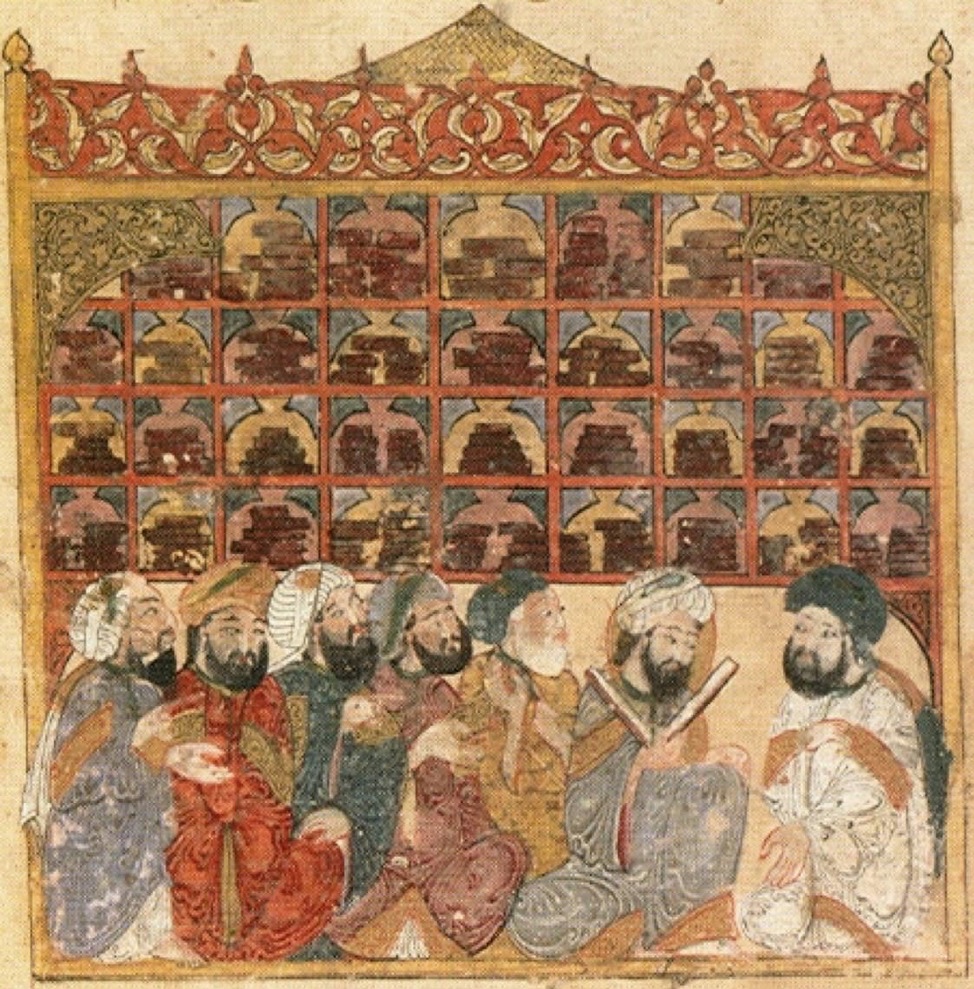Where does it claim that? Languages have been influencing each other. Farsi has half of its vocabulary from Arabic. Before that other Semitc languages like Aramaic influenced Farsi profoundly. In fact without Semites, Iranians/Farsis would not even have a single alphabet or even a scripture as all of your scripture is based on Arabic/Semitic scriptures.
In which universe were "all" Arabs "destroyed"?

Some limited victory against 1 Arab tribe (lol) after getting invaded and sacked and later (apparently) reselling some Arabs in Iran proper.
Mongols killed HALF of Iran's population. In the Arab world Mongols were a footnote aside from the sack of Baghdad and were later defeated by Arabs and Turks in the battle of Ain Jalut.

en.wikipedia.org
Qarmatians were a footnote as well and mostly Arab in origin. Completely Arabized after 1 generation.
You can't compare that with the permanent religious, cultural, linguistic, ancestral change that the Arabs did 1400 years ago. Changes that have existed for 1400 years now.
In short Iran is 1000 times more influenced by Arabs than the other way around. It's not even a comparison. That was always the case, local and far older Semitic civilizations (from the moment Persians appeared in history 2500 years ago) have always influenced Iran and Iranians. Almost everything from your pre-Islamic culture is heavily influenced by Semitic civilization, symbols etc.
Let us see.

en.wikipedia.org
This list below is 2 times as large as this list below:

en.wikipedia.org
Most of your entire pre-Islamic civilization and customs are stolen from Semitic Mesopotamian civilizations millennia older than anything Iranian. They civilized you basically.
Even the Nowruz that you mention is Semitic/Mesopotamian in nature/origin.
Your Lion symbol is stolen from the Babylonian Lion. Kings of Kings title is a Semtic title too. Where do I even begin or end?
Mary Boyce and Frantz Grenet explain the traditions for seasonal festivals and comment: "It is possible that the splendor of the
Babylonian festivities at this season, led the Iranians to develop their own spring festival into an established New Year feast, with the name
Navasarda "New Year" (a name which, though first attested through Middle Persian derivatives, is attributed to the Achaemenian period)."
Akitu was the Babylonian festivity held during the spring month of
Nisan in which Nowruz falls. Since the communal observations of the ancient Iranians appear in general to have been seasonal ones and related to agriculture, "it is probable that they traditionally held festivals in both autumn and spring, to mark the major turning points of the natural year."
[50]

en.wikipedia.org
The oldest civilizations in the world are found in the Arab world. It is funny to read that millennia younger civilizations (Iranian) have supposedly taught Arabs/Semites civilization which they themselves mostly created/contributed the most too in ancient times. Some paradox.
As for that nobody mentioned (some British Iranophile that died 100 years ago, lol) , ignorant/false statements are abound everywhere. Reality is different.

en.wikipedia.org
Edward Granville Browne FBA (7 February 1862 – 5 January 1926) was a British
Iranologist. He published numerous articles and books, mainly in the areas of
history and
literature.
And just for some additional laughter:
Resulting from their extensive exchanges and depth of personal bond, Browne was gifted, by Pirzadeh Naeini a set of
Soufi garb,
and received the title of "Mazhar-e Ali" "Manifestation of Ali." (Imam Ali was the first Imam of the Twelve Imams in
Shia Islam and son-in-law to the
Prophet Muhammad.) Browne wore the garb in his meetings with Persians and used the title in signing all his
Persian correspondence and writings.
[7]
In return, Brown called Pirzadeh "
the guide of the path" and "the repository of the secrets of truth" and "the sage seeker of the path". This relationship led Brown not only to broaden his knowledge and interest in Persia (Iran) but also to ask the
British Foreign Office to assign Browne as a consul at the British Embassy to
Tehran, which eventually resulted in his publishing, 1893,
A Year Amongst The Persian.
[8]
Great source.

Not even 2% of the native population of Arabia is Iranic. The only "Iranic" population of note in Arabia are the Baloch of Oman and they don't even make up 500.000 (many don't have citizenship) and are heavily mixed with the local Arabs (who employed them) and most of their surnames are Arabized as well. There is literally almost nothing Baloch left of them.
By that logic of yours, all of Southern Iran is Arab in origin, lol.
As a final note, even at the height of Iranian power, Arabs were never Iranian subjects.
Arabs were not considered as subjects to the Achaemenids, as other peoples were, and were exempt from taxation. Instead, they simply provided 1,000 talents of
frankincense a year. T
hey also helped the Achaemenids invade Egypt by providing water skins to the troops crossing the desert.
[4]

en.wikipedia.org
As a funny side note, your Shapur II settled many Arabs 2000 years ago in modern-day Iranian cities (according to his own sources) further spreading Arab genes within Iran.
However yes, there has been contacts from both sides as both Arabs/Arabians and Iranians are neighbors so it is normal but there is no comparison when it comes to who influenced who the most. Every historian will confirm this.




 Some limited victory against 1 Arab tribe (lol) after getting invaded and sacked and later (apparently) reselling some Arabs in Iran proper.
Some limited victory against 1 Arab tribe (lol) after getting invaded and sacked and later (apparently) reselling some Arabs in Iran proper.



















